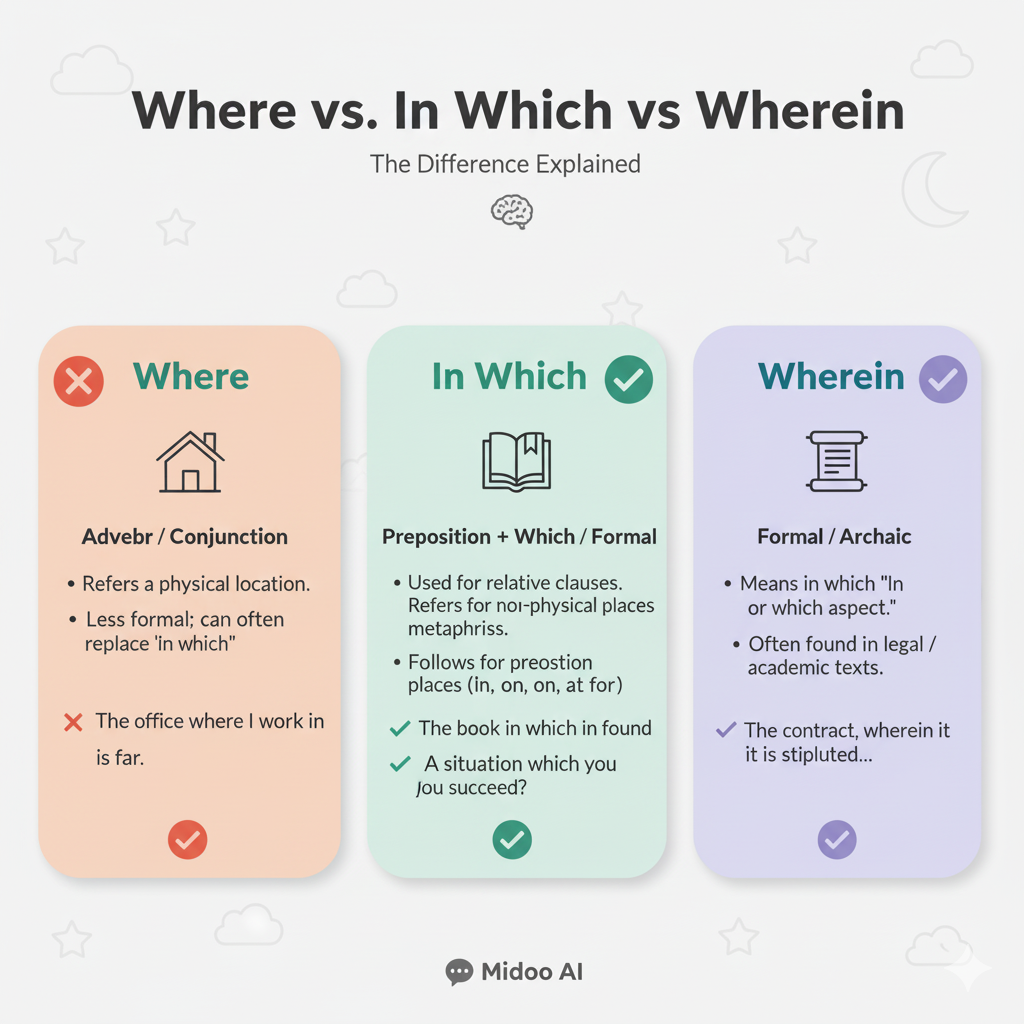Where, In Which, or Wherein? Learn the Difference Easily

English can be tricky—sometimes, three small words can cause big confusion.
If you’ve ever paused while writing, wondering whether to use
**“where,” “in which,” or “wherein,”**you’re not alone.
At Midoo AI, we see this question come up often, so we’ve created a simple guide to help you tell them apart.
Let’s break down their meanings with easy examples and a quick tip to remember them.
Where — Everyday and Natural 🌍
“Where” is the most common of the three.
It’s used to refer to a place or situation and works well in both spoken and written English.
Examples:
- This is the café where we first met.
- I don’t know where he lives now.
- That’s the school where she studied.
- The city where I grew up is beautiful.
- I love places where I can relax.
💡 Tip: Use “where” when talking about locations or situations in a natural, everyday way.
In Which — More Formal 📝
“In which” is more formal and precise.
It’s often used in academic or professional writing, especially after a noun to describe a situation, event, or container.
Examples:
- That’s the box in which the letters are stored.
- The meeting in which we discussed the plan was long.
- He created a system in which everyone can contribute ideas.
- I saw a movie in which the hero saves the world.
- The folder in which you saved the file is missing.
💡 Tip: Use “in which” in formal writing or when you want to sound clear and structured.
Wherein — Rare and Old-Fashioned 📜
“Wherein” means “in which”, but it’s very formal, rare, and old-fashioned.
It mostly appears in legal, academic, or literary texts.
Examples:
- The contract, wherein both parties agreed to the terms, was signed.
- A world wherein everyone is treated equally.
- He read the document wherein the rules were listed.
- The story wherein the hero is betrayed is powerful.
💡 Tip: Use “wherein” only in legal or poetic contexts. For everyday writing, it sounds outdated.
Quick Memory Trick
- ✅ Where → natural, everyday
- ✅ In which → formal, precise
- ⚠️ Wherein → rare, legal or poetic
Example:
- That’s the house where she lives. (everyday)
- That’s the house in which she lives. (formal)
- That’s the house wherein she lives. (very formal / old-fashioned)
FAQ
Q: Can “where” and “in which” be used interchangeably?
A: Often yes, but “in which” sounds more formal and is better in academic writing.
Q: Is “wherein” still used today?
A: Rarely. It appears mostly in legal or very formal documents.
Q: Which one should I use in essays?
A: Prefer “in which” for formal essays. Use “where” in casual or narrative writing.
Q: Is “wherein” the same as “in which”?
A: Yes in meaning, but “wherein” sounds much older and less common.